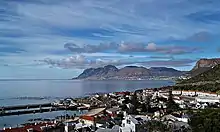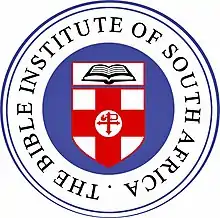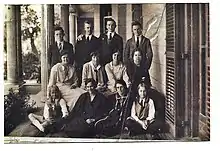Bible Institute of South Africa
The Bible Institute of South Africa is an evangelical Bible college located in Kalk Bay, a suburb of Cape Town on the False Bay coast of the Cape Peninsula, South Africa. The college has students from all over Africa, as well as from Europe, Asia and North America.




BISA [1] is a non-denominational bible training college. Staff and students are drawn from a range of church affiliations in SA and internationally, rather than one single denomination, as would be expected in a Seminary. The method and content of study is Christocentric and employs a historic Protestant and Reformational hermeneutic in the interpretation of the Bible. The teaching ethos is two-fold, not only to impart knowledge, but to take that knowledge and use it in the development of the skills and character needed by the student to be effective in life and service.
The outcome for each student is to be able to think rationally, clearly and critically about life issues in a way that is biblical and sustainable in a context of serving others in multi-faith, multi-cultural and international communities. The college functions as a community in residence, sharing tuition, meals, assemblies and prayer times together.
Since its founding in 1923 BISA has trained over two thousand men and women in a variety of subjects including Hermeneutics, Biblical and Systematic Theology, the Doctrines of Scripture, Old and New Testament Studies, Ontology, Christian Thinking and Hebrew & Greek bible languages.
History
In the early part of the 20th century formal theological education in South Africa was only available in the universities. In the 1920s three church leaders, the Rev. Marsh, Rev.Douglas and Rev. Dr J. R. L. Kingon FRSE, were concerned with the commitment to bible teaching in the theological departments of the time. With this in mind they proposed to endow a theological professorship at one of the South African universities, but because of the prevailing liberal theological influence, their wish was frustrated. They subsequently planned to establish a college where the evangelical doctrines of the bible would be taught. In 1923, they founded the Bible Institute of South Africa in Mowbray in the Cape Peninsula. Their intention was to create academic training of a high quality – at a degree level – in order to provide Churches in South Africa with men and women equipped to meet the challenge of a post-war world. Immediately prior to World War II the Institute moved to Kalk Bay, and has developed into the present campus where the BTh programme is accredited by the South African Council on Higher Education for contact and distance modes.
Courses and Accreditation [2]
The college has several hundred students involved in a selection of courses. The residential course comprises a Bachelor of Theology, BTh (CHE accredited) and a Christian Foundations Gap-Year (not accredited). Programmes for off-campus students include a correspondence-based Distance Learning Programme - a Bachelor of Theology, BTh (CHE accredited) as well as a part-time Christian Leadership Programme, the CLP (not accredited). The residential courses include weekly practical ministry experience as well as a one-week Community Outreach, held annually in March.
The BISA Winter School held annually in June/July is open to church leaders and workers and offers courses taught by international academics and researchers in their specific fields. Guest speakers have included Darrell Bock [3] Doug Moo,[4] Craig Blomberg,[5] Greg Cook [6] George H Guthrie [7] and Bill Mounce.[8] Two colleagues travel annually to Africa to lecture in the CLP programme on campus; Robert W. Yarbrough [9] and Pastor Bill Shields [10] Classes are held on campus in the residential programme and by distance in the Distance Learning Programme. Both programmes use the Learning Management System CANVAS in addition to specifically developed software B-SIS online.
In March 2020 due to the Covid-19 pandemic and following RSA presidential directives, all courses migrated to online tuition, until the cessation of lockdown.
The Bible Institute of South Africa is registered with the Department of Higher Education and Training until 31 December 2022 as a private higher education institution under the Act. Registration certificate No. 2018/HE08/002.[11]
Principalship
Since its founding year 1923, the Bible Institute has appointed eleven Principals –
- Alfred Daintree (1923–38);
- Joseph Ward (1939);
- Arthur Taylor (1940–45);
- Stuart Law (1945–53);
- Sandy Gilfillan(1953-1959);
- Murdo Gordon (1960–81);
- Clive Tyler (1981-1994);
- Bryan Williams (1995-1999);
- Tom Austin (2000–04);
- Raymond Potgieter (2006–11);
- Daniel Simango (2014 - to present date)
The college Faculty is made up of full-time and part-time lecturers from South Africa and other countries. The Institute entered into a partnership agreement with Mission to the World in 1997 [12] - the missionary sending agency of the Presbyterian Church in America – in terms of which a number of MTW teachers have joined the Faculty.
The Bible Institute of South Africa partners with several Missions Agencies giving students both pre and post-graduation opportunities to work cross culturally in society.
The Principal, Zimbabwe born Dr Daniel Simango, holds a Licentiate in Theology (LTh) from the Bible Institute of South Africa (2000), a BA in Theology (Cum Laude), a BA Honours in Theology from Potchefstroom University for Christian Higher Education (2002), and a MA in Old Testament from North West University (2006). In 2011, Daniel was awarded a PhD in Old Testament from North-West University. He lectures Old Testament and Hebrew courses to under-graduate students and supervises post-graduate students in Old Testament studies.
College Motto
Motto of the Bible Institute of South Africa is "To know Christ and to make Him known"[13]
References
- "Bible Institute of South Africa: History".
- "BISA Course Accreditation".
- "Dr Darrell Bock".
- "Dr.Douglas Moo".
- "Dr Craig Blomberg".
- "Dr Greg Cook".
- "Dr George H Guthrie".
- "Dr.William Mounce".
- "Dr. Robert W. Yarbrough".
- "Rev Bill Shields".
- "Department of Higher Education and Training RSA".
- "Mission to the World".
- "BISA Mission & Vision Statement".